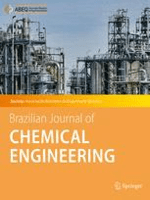
BRAZILIAN JOURNAL OF CHEMICAL ENGINEERING
Scope & Guideline
Connecting Ideas, Inspiring Innovations
Introduction
Aims and Scopes
- Catalysis and Reaction Engineering:
Research related to catalytic processes, including the development of novel catalysts, optimization of reaction conditions, and mechanistic studies of chemical reactions. - Environmental Engineering and Waste Treatment:
Studies focusing on the treatment of wastewater, solid waste management, and the development of eco-friendly technologies for pollution reduction. - Biochemical Engineering and Bioprocessing:
Exploration of bioprocesses involving microorganisms and enzymes for the production of biofuels, biochemicals, and other valuable products. - Process Optimization and Simulation:
Application of modeling, simulation, and optimization techniques for improving chemical processes and systems, including the use of computational fluid dynamics. - Material Science and Nanotechnology:
Research on advanced materials, including nanocomposites and their applications in catalysis, energy storage, and environmental remediation. - Thermodynamics and Transport Phenomena:
Investigations into the thermodynamic properties of materials and the transport phenomena involved in chemical processes. - Renewable Energy and Sustainability:
Studies addressing the conversion of renewable resources into energy and materials, emphasizing sustainable practices in chemical engineering.
Trending and Emerging
- Sustainable and Green Chemistry:
There is an increasing emphasis on sustainable practices and green chemistry, focusing on reducing environmental impact and enhancing resource efficiency in chemical processes. - Bioprocessing and Biotechnology:
Research in bioprocessing, particularly involving the use of microorganisms and enzymes for sustainable production of chemicals and biofuels, is gaining momentum. - Nanotechnology Applications:
Emerging studies on nanomaterials and their applications in catalysis, drug delivery, and environmental remediation are on the rise, showcasing the potential of nanotechnology in chemical engineering. - Advanced Wastewater Treatment Technologies:
Innovative approaches to wastewater treatment, including the use of electrochemical methods and advanced oxidation processes, are increasingly being explored. - Process Integration and Intensification:
Research focusing on the integration and intensification of chemical processes, aiming to improve efficiency and reduce energy consumption, is trending. - Data Science and Machine Learning in Chemical Engineering:
The application of data science and machine learning techniques to optimize chemical processes and predict outcomes is emerging as a significant trend.
Declining or Waning
- Traditional Chemical Engineering Processes:
There is a noticeable decrease in research focused on conventional chemical engineering processes, as the field shifts towards more innovative and sustainable approaches. - Single-Use Plastics and Non-Biodegradable Materials:
Research on traditional plastic materials and their processing is declining, likely due to growing concerns over sustainability and a pivot towards biodegradable alternatives. - Non-Renewable Energy Sources:
Studies centered around fossil fuel-based processes are becoming less prominent, reflecting a broader industry trend towards renewable energy sources and sustainable practices. - Basic Thermodynamics:
While still important, basic thermodynamic studies appear to be less prevalent as researchers focus on applied thermodynamics in complex systems and novel applications. - Traditional Separation Processes:
Research focusing solely on conventional separation techniques, such as distillation, is waning as more efficient and innovative separation technologies gain traction.
Similar Journals
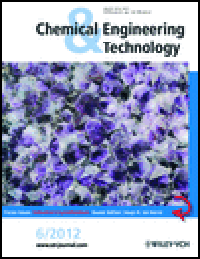
CHEMICAL ENGINEERING & TECHNOLOGY
Connecting Theory and Practice in Chemical EngineeringChemical Engineering & Technology is a prestigious journal published by Wiley-VCH Verlag GmbH, focusing on the evolving field of chemical engineering and its related disciplines. With an ISSN of 0930-7516 and E-ISSN of 1521-4125, the journal has established a robust platform for researchers and practitioners to share pioneering studies and innovative technologies within the field. Classified in the second quartile (Q2) across multiple categories such as Chemical Engineering, Chemistry, and Industrial and Manufacturing Engineering, it holds an impressive rank in the Scopus database, indicating its significant contribution to the academic community. The journal's commitment to advancing knowledge is reflected in its extensive convergence of research from 1987 to 2024, providing a comprehensive archive of scholarly work. Researchers, professionals, and students benefit from the latest insights and findings, enriching the dialogue around chemical processes and methodologies. Though it operates under a traditional subscription model, the accessibility of this journal is crucial for those engaged in both theoretical and applied aspects of chemical engineering.

ChemEngineering
Pioneering Open Access Research in Chemical EngineeringChemEngineering is a prominent open-access journal published by MDPI that has been dedicated to the dissemination of high-quality research in the field of chemical engineering since its inception in 2017. Operating out of Switzerland, this journal addresses a diverse range of topics, including energy production, process optimization, and innovations in materials science, thereby attracting contributions from researchers and professionals worldwide. With an impressive Q2 ranking in Chemical Engineering and Engineering, as well as a Q3 ranking in Energy for 2023, ChemEngineering is positioned as a crucial platform for advancing knowledge in its fields. The journal's commitment to open access ensures that its content is readily available to a broad audience, promoting the free exchange of ideas and fostering collaborations. Researchers, professionals, and students alike benefit from the journal's focus on cutting-edge research, making it an essential resource for anyone interested in the ever-evolving landscape of chemical engineering.

Journal of Chemistry and Technologies
Advancing Chemistry, Inspiring Innovation.The Journal of Chemistry and Technologies, published by OLES HONCHAR DNIPROPETROVSK NATIONAL UNIVERSITY, is an open access journal dedicated to advancing knowledge in the broad fields of chemistry and chemical engineering since its inception in 2013. With ISSN 2663-2934 and E-ISSN 2663-2942, this journal provides a vital platform for researchers and professionals, particularly in Ukraine and beyond, to share innovative research findings and contemporary technological advancements. Currently ranked in the Q4 quartile in both Chemical Engineering and General Chemistry for 2023, it serves as an enriching resource for those interested in emerging trends and interdisciplinary studies within these domains. The journal adheres to high academic standards while fostering collaboration in the scientific community by offering open access articles that ensure visibility and accessibility to a global audience. As an important part of the academic landscape, the Journal of Chemistry and Technologies aims to inspire future research and development, paving the way for new discoveries and applications in chemistry-related fields.

CHEMICAL AND PETROLEUM ENGINEERING
Driving Efficiency Through Groundbreaking ResearchChemical and Petroleum Engineering is a prestigious academic journal dedicated to the advancement of knowledge in the fields of chemical engineering and petroleum technologies. Published by Springer, this journal serves as a vital resource for researchers, professionals, and students interested in the intricate processes and innovations that drive these industries. With an ISSN of 0009-2355 and an E-ISSN of 1573-8329, it has established a notable presence since its inception in 1965. Throughout its converged years, the journal has continually published impactful research that contributes to sustainability and efficiency within the sectors. Although it holds a Q3 ranking in Chemical Engineering and Fuel Technology and a Q4 ranking in Energy Engineering and Geochemistry, it is a noteworthy platform for emerging studies, fostering connections among scholars. Readers will find a wealth of information and ideas, but please note that this journal does not currently offer open access options. For those passionate about chemical and petroleum engineering, this journal is an essential part of staying informed and engaged with the latest scientific advancements.

Frontiers in Chemical Engineering
Leading the Charge in Chemical Engineering ResearchFrontiers in Chemical Engineering is an esteemed open-access journal published by Frontiers Media SA, dedicated to advancing knowledge in the dynamic field of chemical engineering. Since its inception in 2019, this journal has rapidly gained recognition for its rigorous peer-reviewed articles and innovative research contributions, achieving notable quartile rankings such as Q2 in Chemical Engineering and Q3 in both Bioengineering and Catalysis by 2023. With an emphasis on providing accessible and cutting-edge research, the journal caters to a diverse audience of researchers, professionals, and students interested in the latest developments and methodologies within the chemical engineering discipline. Hailing from Lausanne, Switzerland, Frontiers in Chemical Engineering embodies a commitment to enhancing collaborative scientific communication, making crucial research findings available without barrier. By publishing high-quality articles that address both theoretical advancements and practical applications in chemical engineering, this journal serves as a pivotal resource for fostering innovation and collaboration across the global research community.

Chemical Product and Process Modeling
Empowering researchers with vital insights in chemical product development.Chemical Product and Process Modeling is a vital academic journal published by WALTER DE GRUYTER GMBH, focusing on the intricate intersection of chemical engineering and mathematical modeling. Since its inception in 2006, this journal has been instrumental in disseminating significant research findings and methodologies that advance the modeling and simulation of chemical products and processes. With an ISSN of 1934-2659, it caters to a global audience from its base in Berlin, Germany. Although positioned within the Q3 and Q4 quartiles in Chemical Engineering and Modeling & Simulation categories respectively in 2023, it offers a platform for innovative approaches and contributions in these fields, making it a resource for researchers and industry experts alike. Access to the journal's content is offered through subscription models, enabling professionals and academics to stay abreast of the latest developments. In a rapidly evolving scientific landscape, Chemical Product and Process Modeling remains dedicated to enhancing knowledge and fostering collaboration within the chemical engineering community.

CHEMIE INGENIEUR TECHNIK
Pioneering Research in Chemical Processes and Applications.CHEMIE INGENIEUR TECHNIK, published by WILEY-V C H VERLAG GMBH, stands as a significant academic journal in the fields of Chemical Engineering, Chemistry, and Industrial and Manufacturing Engineering. With an ISSN of 0009-286X and an E-ISSN of 1522-2640, this esteemed journal has been contributing to the body of knowledge since 1949 and plans to continue its legacy until 2024. Notably, the journal holds a Q2 quartile ranking in 2023 across various categories, illustrating its recognized impact and relevance within the scientific community, with Scopus ranks indicating it falls within the top 60th to 51st percentiles of its respective fields. Although currently not open access, CHEMIE INGENIEUR TECHNIK provides readers with comprehensive insights into contemporary research, technological advancements, and practical applications, making it an essential resource for researchers, professionals, and students who are keen to stay abreast of developments in chemical processes and engineering advancements.
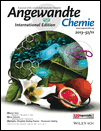
ANGEWANDTE CHEMIE-INTERNATIONAL EDITION
Elevating Global Chemistry Standards Since 1962ANGEWANDTE CHEMIE-INTERNATIONAL EDITION, published by WILEY-V C H VERLAG GMBH, stands as a leading journal in the fields of Chemistry and Catalysis, holding a prestigious position with a Q1 ranking in both categories as of 2023. With an ISSN of 1433-7851 and an E-ISSN of 1521-3773, this esteemed publication has been an invaluable resource for the global scientific community since its inception in 1962. The journal's impact is further underscored by its remarkable Scopus rankings, where it occupies the 13th place among 408 journals in General Chemistry and the 4th place among 68 in Chemical Engineering - Catalysis, marking it in the 96th and 94th percentiles, respectively. Although it does not offer Open Access, ANEWANDTE CHEMIE-INTERNATIONAL EDITION remains essential for researchers, professionals, and students seeking to stay abreast of cutting-edge developments and innovations in chemical sciences. Its comprehensive scope and rigorous peer-review process ensure that only the highest quality research finds its way to publication, contributing significantly to the advancement of chemistry worldwide.
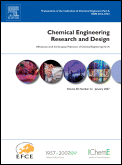
CHEMICAL ENGINEERING RESEARCH & DESIGN
Advancing the Frontiers of Chemical Engineering.CHEMICAL ENGINEERING RESEARCH & DESIGN is a prestigious journal that has been at the forefront of dissemination in the fields of chemical engineering and general chemistry since its inception in 1983. Published by Elsevier, the journal features a rich array of research articles that contribute to both theoretical and practical advancements in the discipline. With an impact factor that positions it strongly within the Q2 quartile for both Chemical Engineering and Chemistry categories, it occupies an esteemed place in the academic community, being ranked #77 out of 273 in Chemical Engineering and #111 out of 408 in General Chemistry on Scopus. Researchers and professionals will find it an invaluable resource for cutting-edge research and innovative methodologies that shape the future of chemical engineering applications. While the journal does not currently offer open access, it remains accessible through institutional subscriptions, ensuring that important findings continue to reach a broad audience. With a scope that is poised to expand through 2024, the journal aims to foster collaboration and knowledge sharing, supporting the continuous evolution of the field.
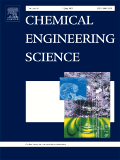
CHEMICAL ENGINEERING SCIENCE
Unveiling Insights that Shape Modern Engineering PracticesChemical Engineering Science is an esteemed journal published by Pergamon-Elsevier Science Ltd, dedicated to advancing the field of chemical engineering through high-quality research and innovation. With a storied history spanning from 1951 to 2025, this journal is recognized as a leading platform for disseminating cutting-edge studies, encompassing a diverse range of topics within chemical engineering, applied mathematics, and industrial engineering. Notably, it holds a prestigious Q1 ranking in several categories, including Chemical Engineering and Industrial and Manufacturing Engineering, indicating its significant impact and influence in these fields. The journal is not open access, yet it maintains a robust readership and is widely cited in academic circles, reflecting its vital role in shaping modern engineering practices. As a vital resource for researchers, professionals, and students alike, Chemical Engineering Science continues to bridge theoretical concepts and practical applications, fostering a deeper understanding of the complex challenges in chemical processes and manufacturing.